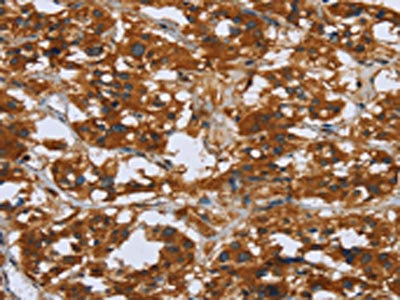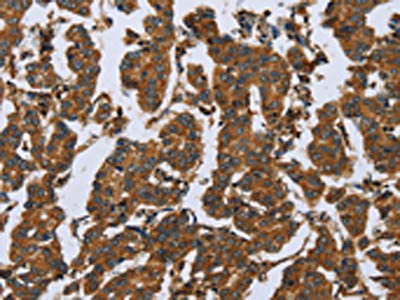
The image on the left is immunohistochemistry of paraffin-embedded Human thyroid cancer tissue using CSB-PA556201(COMP Antibody) at dilution 1/50, on the right is treated with fusion protein. (Original magnification: x200)
COMP Antibody

CSB-PA556201
ApplicationsELISA, ImmunoHistoChemistry
Product group Antibodies
ReactivityHuman
TargetCOMP
Overview
- SupplierCusabio
- Product NameCOMP Antibody
- Delivery Days Customer20
- ApplicationsELISA, ImmunoHistoChemistry
- CertificationResearch Use Only
- ClonalityPolyclonal
- ConjugateUnconjugated
- Gene ID1311
- Target nameCOMP
- Target descriptioncartilage oligomeric matrix protein
- Target synonymscartilage oligomeric matrix protein; cartilage oligomeric matrix protein (pseudoachondroplasia, epiphyseal dysplasia 1, multiple); CTS2; EDM1; EPD1; MED; PSACH; pseudoachondroplasia (epiphyseal dysplasia 1, multiple); THBS5; thrombospondin-5; TSP5
- HostRabbit
- IsotypeIgG
- Protein IDP49747
- Protein NameCartilage oligomeric matrix protein
- Scientific DescriptionThe protein encoded by this gene is a noncollagenous extracellular matrix (ECM) protein. It consists of five identical glycoprotein subunits, each with EGF-like and calcium-binding (thrombospondin-like) domains. Oligomerization results from formation of a five-stranded coiled coil and disulfides. Binding to other ECM proteins such as collagen appears to depend on divalent cations. Mutations can cause the osteochondrodysplasias pseudochondroplasia (PSACH) and multiple epiphyseal dysplasia (MED).
- ReactivityHuman
- Storage Instruction-20°C or -80°C
- UNSPSC12352203

